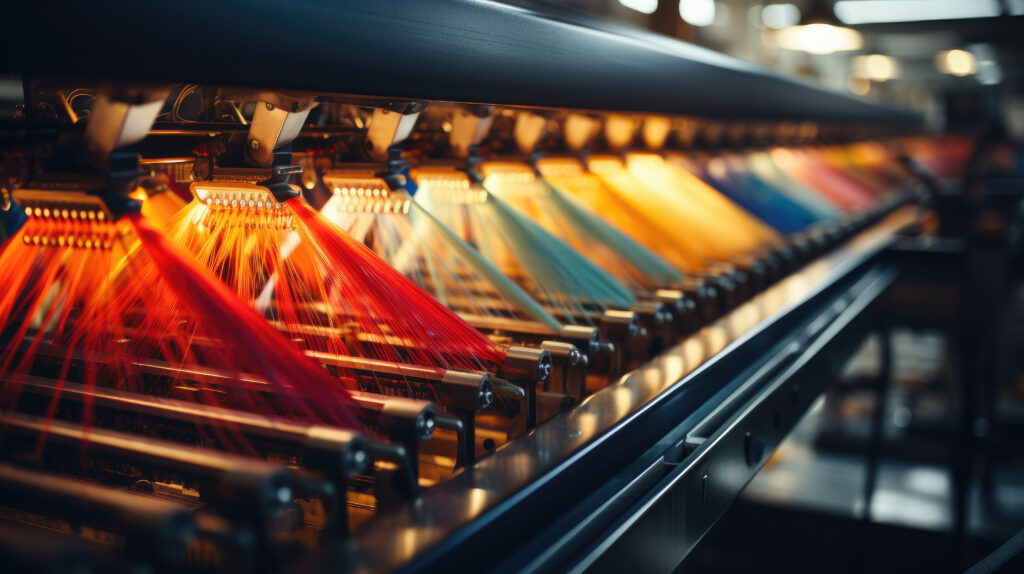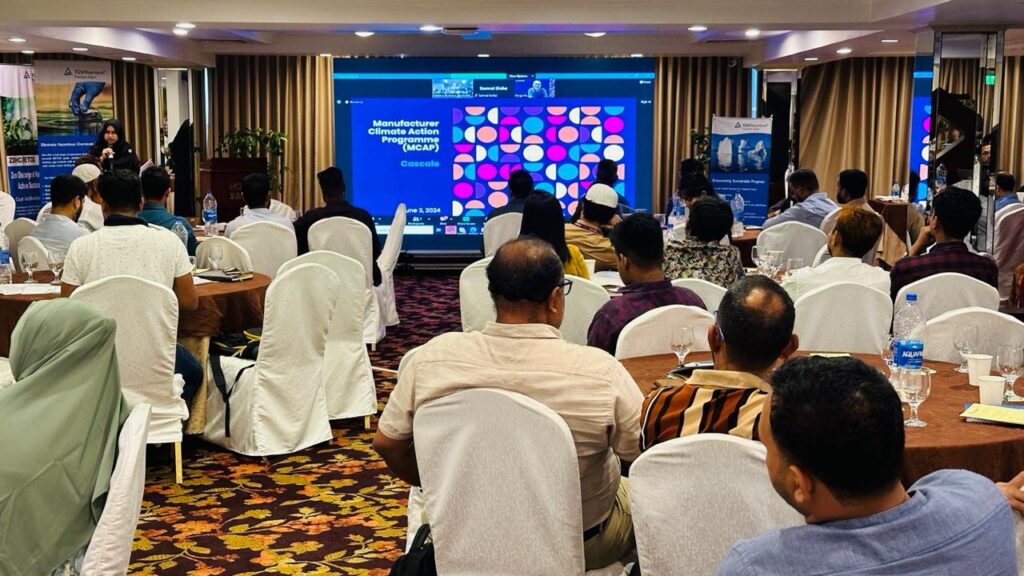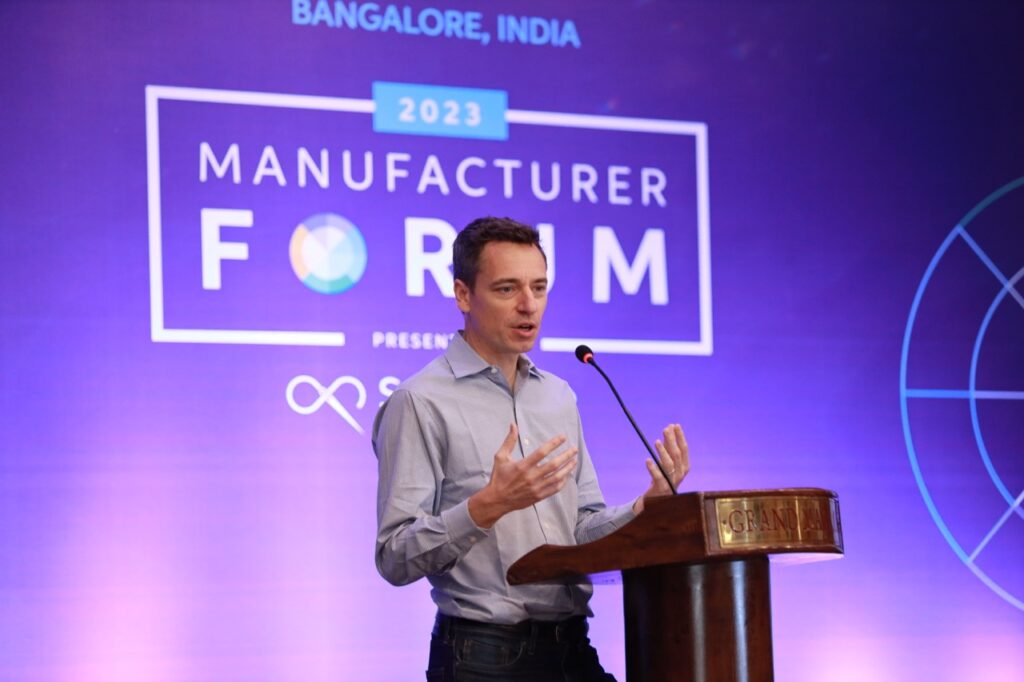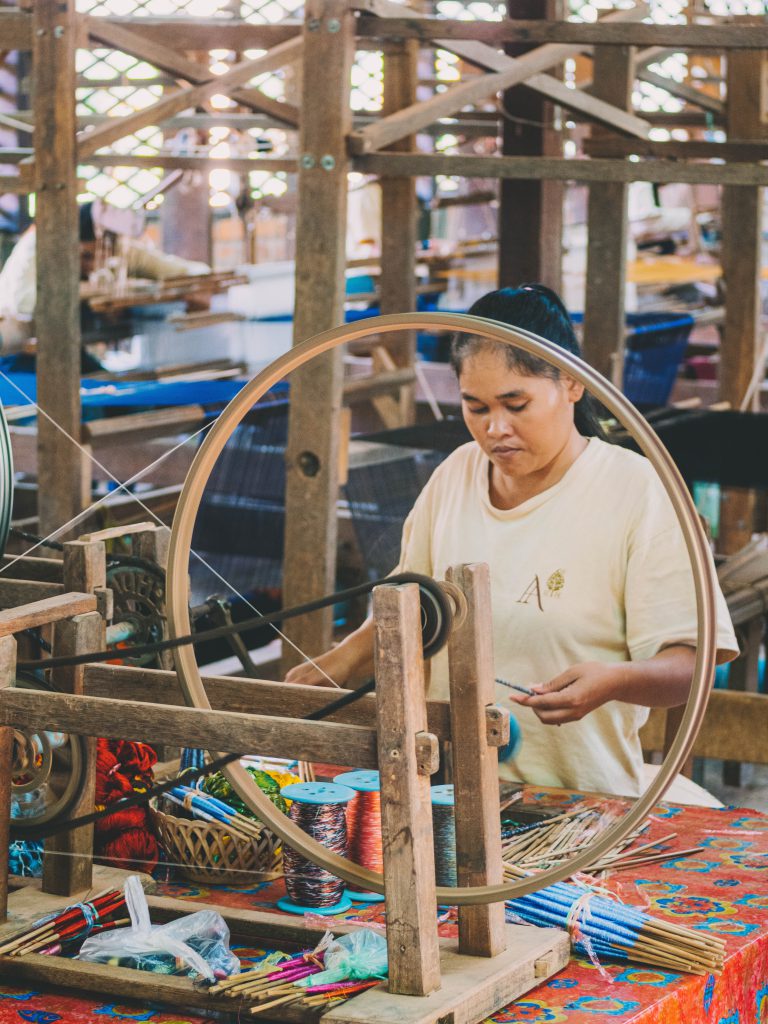
Dear Fashion: Let’s Step Up and Get Aligned
In a recent opinion editorial with WWD, CEO Colin Browne argues fashion needs to take more serious and coordinated action on sustainability. Read the highlights here!

Ringo Yu, manager, Manufacturer Climate Action Program (MCAP) at Cascale, recently presented the program via webinar to manufacturers in Indonesia and Bangladesh.
The sessions were hosted by TÜV Rheinland, an MCAP appointed science-aligned target validation organization. Over 150 apparel sector companies including brands, retailers, and tier one and two suppliers, some of whom are Cascale members, participated in the training day in which they discussed Scope 3 emissions and target setting, after which Yu presented details on the MCAP program about the science-aligned targets (SATs) on Scopes 1 and 2 .
Yu shared core information on Cascale’s evolution over the past 15 years, now counting over 300 members across the consumer goods value chain. He then shared more about Cascale’s Higg Index, a leading end-to-end sustainability measurement suite of tools, before leading the presentation on MCAP.
Stating the call to action that to stay within 1.5°C of warming we must reduce global greenhouse gas emissions 45 percent by 2030, and to net zero by no later than 2050, Yu detailed Cascale’s MCAP Supplier Climate Engagement and Onboarding Program. It was developed in partnership with Nike and Target and launched in September 2023. As Yu explained, the goal of MCAP is to drive a common approach to accelerate manufacturers’ progress in measuring GHG emissions, setting targets, reporting on progress on MCAP disclosure dashboard on Cascsale website publicly, and mitigating climate change risk and development of corporate decarbonisation plan.
Yu shared that MCAP is modeled on the Science Based Targets Initiative (SBTi) corporate near-term criteria, presenting an intermediate step towards net-zero targets to support Cascale’s perspective that only by aligning on a path forward and acting collectively can the industry address the systemic challenges associated with climate change and positively impact the planet.
Accessible to Cascale members and non-members alike, MCAP accelerates target setting for manufacturers and includes advisory support to help them get started on their decarbonization journey. With the second cadence kicking off in September, Yu invited all attendees to participate.


Cascale (formerly the Sustainable Apparel Coalition) collaborated with Fashion Charter Decarbonization Working Group members on the UN Fashion for Climate Report, Guidance for Measuring Greenhouse Gas Emissions for Purchased Goods and Services in the Apparel and Footwear Industry. Prior to this publication, there was no sector-specific guidance on how to calculate carbon emissions in the upstream supply chain, a complicated process that requires blending factory-specific data when available and industry averages elsewhere. This report provides the industry with technical guidance that will enhance the consistency, accuracy, and comparability of carbon emissions calculations. The work reflects Cascale’s organizational focus on collaboration to drive emissions reduction in the apparel and wider consumer goods industry.
Collaborating with the UN Climate Change-convened Fashion Industry Charter for Climate Action (Fashion Charter) and with members of its Decarbonization Working Group, Cascale led the development of guidance specific to measuring category 1 of Scope 3: Purchased Goods and Services (PG&S), which represents the vast majority of a fashion company’s carbon footprint. To develop the initial report, the organization received input from over a dozen brands, manufacturers, consultancies, and other industry stakeholders. After a draft review, Cascale incorporated feedback into the final report, with support from UNFCCC.
For apparel and footwear brands and retailers, PG&S emissions result from all of the value chain activities that go into making finished products, from raw materials to fabric development to product manufacturing. Given the magnitude of PG&S for brands and retailers, the language in this report is generally tailored for them; however, the guidance can also be used by finished goods manufacturers, textile manufacturers, and other “upstream” companies to measure their PG&S emissions.
Cascale drives impact at scale through three foundational pillars — Combat Climate Change, Decent Work for All, and Nature Positive Future — forming a unified strategy for industry transformation through collective action programs that guide members from action to impact. Cascale’s Decarbonization Program, launched in 2022, is one leading example of these programs in action. It aims for members to achieve a 45 percent reduction in greenhouse gas (GHG) emissions by 2030. As of 2023, Cascale’s corporate members are required to set science-based targets (SBTs) for reducing GHG emissions by the end of 2023, when the organization launched the Manufacturer Climate Action Program (MCAP), over 50 percent of these members had set or committed to setting SBTs. To learn more about participating in this program, please complete the MCAP Expression of Interest form. To learn more about this report, please contact higgindex@cascale.org.

Over 200 in-person attendees joined the Sustainable Apparel Coalition (SAC), for the second edition of its Manufacturer Forum, on December 4, 2023 in Bangalore, India. Building on the theme, Catalysts for Change, the event brought together business leaders and stakeholders to discuss the future of sustainability, supply chain compliance, verification, policy alignment, and more.
“The use of the Higg Index tools is just one step of many that we must take to solve the most complex sustainability challenges for the sector,” said Jeremy Lardeau, vice president Higg index at the SAC. “This is why we do not stop at delivering data and tools, but also develop programs and events like Manufacturer Forums, where stakeholders can come together and take collective action for industry progress.”
Dr. Vidhura Ralapanawe, executive vice president at Epic Group and an SAC board director delivered a thoughtful keynote, calling for urgent action to combat climate change. “How much we do, and how fast we work to decarbonize, and how much we aspire to achieve is on us. Because climate change is not happening in 2030 or 2050, it’s happening now. This is our chance, our choice,” Ralapanawe said.
Dr. Laxmikant Jawale, regional lead for South Asia & Southeast Asia at the Apparel Impact Institute (Aii), and Erlinda Lee, director of global membership development from the SAC, delved into a discussion that explored the dynamic collaboration between the SAC and Aii. The session allowed attendees to gain a deeper understanding of the mission, purpose, and collaborative efforts of both organizations to propel the industry forward. It also provided valuable knowledge on how to leverage programs offered through the partnership to effectively tackle the challenges associated with decarbonization and how manufacturers can get involved
Later that day, sessions explored critical issues including climate change, how policy and legislation impacts manufacturers, and the evolving landscape of sustainability verification.
Ringo Yu, manager of the SAC’s Manufacturer Climate Action Program (MCAP) highlighted the compounding impact of climate change, such as how extreme heat waves, torrential rain, and flooding impacts India’s community, natural environment, and economy. He shared that there’s currently a low level of science-based target adoption in the apparel, footwear, and textile sector. He shared insights on the newly launched program and how the SAC is spearheading and amplifying industry initiatives for combating climate change. The program aims to accelerate the number of manufacturers at corporate level to set science-aligned targets for scope 1 and 2, enhance their understanding on climate change related risks, and explore opportunities to take climate actions. “It is important to pursue a leadership mindset first and take action individually to drive change collectively by participating in programs such as the MCAP,” Yu said.
Gauri Sharma, assistant general manager of communications and sustainability innovation at Shahi Exports Pvt Ltd. joined Mousumi Sarang, country manager for India at the Fair Wear Foundation to discuss the intricacies of current and future policy challenges in the textile industry. ”Legislations built and shaped in the Global North have a deep cascading effect in the supply chain, Sharma said. “Hence in the Global South, it is important to develop an understanding of what these means for manufacturers.”
Angela Ng, director of Higg Facility Tools at the SAC, Janne Koopmans, head of collaboration at ZDHC, and Yashinth Wijerathne, manager of environmental sustainability at Hirdaramani Apparel, discussed the recently launched Higg FEM 4.0 and its vital role in standardized measurement and accurate reporting. “The Higg FEM 4.0 allows manufacturers to see what is really important and evolve from there,” Ng said.
Dhawal Mane, director of training and verification at the SAC, and Jeremy Lardeau, SAC vice president of Higg Index, presented on the evolving landscape of sustainability verification within the industry. “Higg FEM verification growth over the past 5 years has demonstrated the collaboration of SAC members on a shared environmental assessment. It is time to simultaneously invest in value through evolving our approach for verification. Our Core verification approach this year is the first step in that direction,” Mane said.
Attendees also received training to support their Higg FEM 4.0 self-assessment, get certified in setting Science-Based Targets, and develop plans for health and safety remediation and workers rights.
The SAC announced the return of Manufacturer Forums earlier this year, with the first in-person event taking place in Shenzhen, China on July 25 at Sheraton Shenzhen Futian Hotel. This was the first in-person Manufacturer Forum the SAC had hosted since 2019.
The Bangalore Manufacturer Forum online photo gallery is available here. Manufacturers who are interested in participating in an upcoming Manufacturer Forum can click here to subscribe for updates.

The Sustainable Apparel Coalition hosted a series of webinars to introduce the Manufacturer Climate Action Program (MCAP) to members located in Asia, North, Central, and South America (AMER) and Europe, the Middle East, and Africa (EMEA). The focus was to introduce MCAP as an integral part of SAC Decarbonization Program for SAC members and non-members alike, with a primary objective to accelerate the adoption of science-aligned targets for Scope 1 and 2 emissions, as well as to highlight the SAC’s strategic partnership with Aii’s Carbon Leadership Program (CLP).
Joyce Tsoi, SAC director of Collective Action, APAC, hosted the webinar, and introduced Ringo Yu, the new MCAP manager. Presenters also included Andres Bragagnini, manager of stakeholder engagement and Tamara Wulf, vice president of programs at the Apparel Impact Institute (Aii) and member of the apparel alliance, which the SAC formed in partnership with Textile Exchange and Zero Discharge of Hazardous Chemicals (ZDHC) to create a connected, end-to-end path to action for the entire apparel and footwear industry.
Yu shared information about the SAC’s Collective Action team, which oversees the development of its Decarbonization Program in support of the organization’s goals to achieve a 45 percent greenhouse gas (GHG) emission reduction in line with science-based targets (SBTs) by 2030 — and to zero by 2050. The SAC launched the Decarbonization Program in 2022 and integrated SBTs into SAC’s membership requirements in 2023, with over 50 percent of members having taken this action to date.
In September of this year, the SAC announced the launch of the Manufacturer Climate Action Program (MCAP). Designed in collaboration with NIKE and Target Corporation, the MCAP is a critical component of the SAC’s Decarbonization Program, designed to catalyze support and drive the sector toward ambitious yet necessary CO2 emissions reductions.
Tsoi shared the four key elements that form the core of MCAP, empowering manufacturers to take critical action to set science-aligned targets, reduce emissions and improve operational efficiency in order to advance industry goals. Then Bragagnini and Wulf detailed Aii’s Carbon Leadership Program, which can help manufacturers develop and implement a factory-level implementation plan by using Aii’s factory-level carbon toolkit, impact measurement, and validation to achieve their carbon reduction targets. They also shared details of Aii’s program portfolio. The portfolio covers a range of impact programs focused on achieving actual CO2e reductions through energy efficiency and the transition to renewable energy and away from fossil fuels. Finally, Tsoi encouraged SAC brands and manufacturer members to sign up and participate in MCAP from Q1 2024, and Aii invited the factories to participate in their programming.